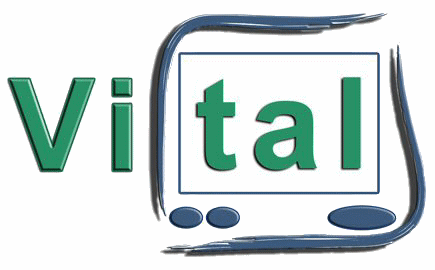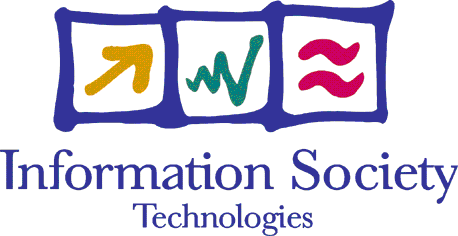VITAL IST-2006-030600
(2007-2010).
Keywords: EC VI Framework. IST. Elderly Assistance. TV Services. Mobile Services. intelligent Agents. Natural Speech Processing.
Project Summary
The objective of the VITAL project will be to develop a set of technologies, platforms and applications with the aim to provide remote assistance to elderly users. The VITAL insight presents a new concept of remote assistance that differs from traditional schemes in the sense that it is concerned not only with elementary subsistence needs but also with the aim to significantly increase the quality of life of the average elderly user. VITAL will intend to put in practice, inside an integrated environment, the concept of Total Assistance; understood as assistance anytime, anywhere, using any terminal and for any type of service. Using existing infrastructures and domestic terminals, VITAL is designed to deliver advice, assistance, information, education, entertainment and inter-personal communications to the users.
VITAL will offer a platform for services that can be used before and after retirement so that the users will be able to perform at any time in their already familiar environment by selecting at every moment the services that suit them best without the need to change the vehicle for those services; services that will evolve in time with the user and may range from alarms and supervision to leisure, education and intelligent information.
VITAL key innovations will require research work in three basic fields: advanced user interfaces over readily available domestic terminals that are specifically designed for the elderly (i.e. TV and mobiles), intelligent systems able to offer personalised information and services in an active way and speech understanding technologies with the aim to provide natural speech dialogue with the machine and automatic summarising capabilities. For this purpose, VITAL will address several state of the art research topics in the IST today: anywhere / anytime computing, intelligent agents technology, true personalisation, mobile and TV applications, active systems, natural speech processing, location sensing, advanced video services.
Project Objectives
Our seniors deserve better quality of life and more integration into the mainstream of the society. Fulfilling the needs of elderly people is one of the most imperative problems in Western societies that still have no adequate answers from the responsible authorities. The progressive ageing of the population in most Western societies and the need to provide better services to a larger number of users presents an important challenge to the responsible authorities because, in spite of the important increase of resources, they are unable to cope with the exponential increase of the demand. There is general consensus about the fact that the best way to improve this situation is the progressive introduction of technical aids to allow the users to achieve a more independent life by means of remote assistance. However those services still suffer from poor levels of efficiency and quality due to the intensive use of manpower and the low penetration of information technologies. But social demands are not the only reason to attend the needs of elderly users: the increased period of retired life, the continuous growing in the number of persons in this category and the improvement of their economies will make elderly users one of the leading social groups to consider when evaluating customer’s purchase decisions and hence elderly users will become one of the dominant economical market sectors in the near future.
The objective of the VITAL project is to develop a new services platform with the aim to significantly increase the quality of life of the average elderly user. The new platform departs from traditional assistance schemes in the sense that it is not only oriented to satisfying day to day subsistence needs but it considers also other important demands that has deserved little attention up to the moment, such as the need for: information, communication, entertainment, self-education, etc.
The precise definition of the VITAL target user is the following: woman or man, over sixty, in reasonably good physical and mental conditions, able to operate the most common functions of a TV set using a remote controller and for certain services the user must be also able to operate simple applications on a mobile phone. The definition of the target user will contemplate the physical limitations associated with age; such as hard hearing and short sighting. The system will also consider the limitations associated with slow responsiveness, difficulty to understand complex concepts, hard learning curve and difficulty to manage too many simultaneous tasks. For that purpose the system will provide the adequate interfaces that will compensate for such physical impairments within the limits of the main requirements mentioned above: i.e. the capability to operate a remote controller and (optionally) the capability to operate a mobile phone. However, the project will not address physical or mental impairments other than those mentioned above. Such capabilities are not the focus of the project and, if required, must be incorporated as external components, provided by third parties.
The project is meant to encourage and serve users that are willing to achieve an active life inside or outside their home environment. One of the strong points of the project is the possibility to empower elderly users to take care of themselves, with the necessary assistance, and to get access to information and infrastructures that are currently banned for them. In that sense, VITAL is not just another tele-assistance platform. In fact VITAL will use already existing platforms to achieve part of its conventional objectives. VITAL may incorporate medical assistance as one of its supplied services in the future, but medical assistance is NOT one of the objectives of the VITAL project. VITAL DOES include alarm management services, but alarm management is not one of the core VITAL services. There are other good projects in these areas and VITAL will, of course, take advantage of their results; but VITAL will be more concerned with user’s needs that have deserved little attention up to the moment: the need for information, the need for inter-personal communication, the need for personal advice, the need for edutainment, the need to be able to move safely in the physical environment and the need to integrate into the mainstream society. Those are the objectives of the VITAL project.

